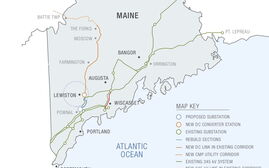Processing Your Payment
Please do not leave this page until complete. This can take a few moments.
- News
-
Editions
View Digital Editions
Biweekly Issues
- December 15, 2025
- December 1, 2025
- Nov. 17, 2025
- November 03, 2025
- October 20, 2025
- October 6, 2025
- + More
Special Editions
- Lists
- Viewpoints
-
Our Events
Event Info
Award Honorees
- Calendar
- Biz Marketplace
Election follow-up: Embattled CMP corridor heads to court, while Bar Harbor restricts short-term rentals
Maine voters made clear some anti-business opinions with opposition to the $1 billion CMP Corridor and a separate effort to cap short-term rentals in Bar Harbor.
Maine voters overwhelmingly supported Question 1, which seeks to block the New England Clean Energy Connect transmission project that would bring hydropower from Quebec to the New England region. About 124 miles of the transmission corridor have already been cleared in western Maine.
Avangrid Inc. (NYSE: AGR), the parent company of Central Maine Power and NECEC Transmission LLC, quickly filed a lawsuit on Wednesday, saying Question 1 was unconstitutional and violated state and federal laws.
The lawsuit, filed in Maine Superior Court in Portland, also contended that the effort was an attempt to cancel a 25-year lease between NECEC and the state of Maine and violated contract clauses intended to protect the sanctity of such contracts from intrusion by the government.
NECEC also asks the Superior Court for an immediate injunction preventing retroactive enforcement of the initiative against the project, so that ongoing construction was not disrupted while this lawsuit proceeds before the courts. NECEC expects the Superior Court to rule on the injunction request promptly.
“I was angered to learn of Avangrid’s legal strategy to overturn the will of an overwhelming majority of Maine voters,” said Sandra Howard, director of No CMP Corridor. “The people of Maine strongly and clearly rejected the NECEC project at the ballot box. CMP should respect the vote of Maine citizens and immediately stop the continued destruction of our precious forest and its habitat.”
Bar Harbor limits short-term rentals
Separately, voters in Bar Harbor on Tuesday passed a new local ordinance to restrict vacation rental housing there.
Under the new rule, short-term rentals that are not occupied by the owner will have a minimum length of stay of four nights and be capped at 9% of the total units in town. Units that are owner-occupied will be allowed with fewer restrictions.
Rentals that are registered with the town before the ordinance takes effect on Dec. 2 may continue operating if they maintain their registration every year.
Mainebiz web partners
Related Content

The Giving Guide
The Giving Guide helps nonprofits have the opportunity to showcase and differentiate their organizations so that businesses better understand how they can contribute to a nonprofit’s mission and work.
Learn More
Work for ME
Work for ME is a workforce development tool to help Maine’s employers target Maine’s emerging workforce. Work for ME highlights each industry, its impact on Maine’s economy, the jobs available to entry-level workers, the training and education needed to get a career started.
Learn More
Groundbreaking Maine
Whether you’re a developer, financer, architect, or industry enthusiast, Groundbreaking Maine is crafted to be your go-to source for valuable insights in Maine’s real estate and construction community.
Learn more-
The Giving Guide
The Giving Guide helps nonprofits have the opportunity to showcase and differentiate their organizations so that businesses better understand how they can contribute to a nonprofit’s mission and work.
-
Work for ME
Work for ME is a workforce development tool to help Maine’s employers target Maine’s emerging workforce. Work for ME highlights each industry, its impact on Maine’s economy, the jobs available to entry-level workers, the training and education needed to get a career started.
-
Groundbreaking Maine
Whether you’re a developer, financer, architect, or industry enthusiast, Groundbreaking Maine is crafted to be your go-to source for valuable insights in Maine’s real estate and construction community.
ABOUT
NEW ENGLAND BUSINESS MEDIA SITES
No articles left
Get access now
In order to use this feature, we need some information from you. You can also login or register for a free account.
By clicking submit you are agreeing to our cookie usage and Privacy Policy
Already have an account? Login
Already have an account? Login
Want to create an account? Register
Get access now
In order to use this feature, we need some information from you. You can also login or register for a free account.
By clicking submit you are agreeing to our cookie usage and Privacy Policy
Already have an account? Login
Already have an account? Login
Want to create an account? Register











0 Comments